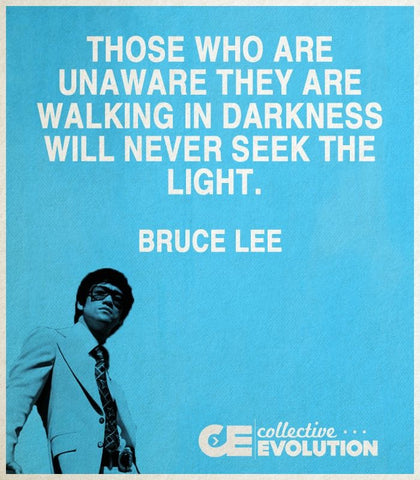Why I love Psychology
"Those who are unaware they are walking in the darkness will never seek the light." - Bruce Lee
OK. So I am suppose to be studying for an exam in Psychology of Personality Theory. But I just had to take a break and write. (Its my therapy). So here goes…
For long as I can remember have wanted to figure people out. I grew up pondering why it was so hard for people to do the right thing? I used to wonder why it was hard for people to speak up stand up for things that matter. I spent many hours bewildered at how people could destroy their lives being entrenched in addictions. I wanted to figure other people out because not only did I not understand people, my lack of understanding made me feel very alone. I didn't seem to struggle with the same kinds of problems that other people had and that made it very hard to relate. So in order to figure out why people do the things they do behave the way they do I was turning to psychology to help me answer some of those questions. I was an atypical teenager who was drawn in by self-help books by the time I was 15 or 16 years old (I even wrote a paper on Freudian Dream Analysis when I was 14, before I even knew who Freud was…LOL). Not only did I learn a lot about myself, but this growing understanding of human behaviour really has helped me to lessen my judgments on other people and to understand the very human struggles that people live with everyday of their lives.
One of the most remarkable things I've learned about human nature, is that most people don't question themselves. Most people don't ask themselves “why am I doing what I'm doing? why did I behave in the way?” people seldom self-reflect. And often times we reach crisis points our lives because we've been following a path and not ever questioning where we're going or why. And it's interesting to think of how things like health crisis, such as getting cancer, or events as awful as losing a loved one are the big wake-up calls that make us look at our lives and ourselves in a more self reflective way. Many cancer survivors credit their illness for being the catalyst for transformation in their lives. I get it, there is no bigger wake up call than facing our own mortality.
The beauty of psychology really is that it helps us to identify areas of our lives that are largely unconscious and brings it to the surface we can evaluate our own traits and tendencies and habits on the basis of “is this serving my growth and development? Or is this NOT serving me?”
I have had countless personal uncoveries and insights of self-awareness, which at times have left me feeling disillusioned with myself, while at the same time being very liberating and freeing. C.J. Jung was the champion of examining our inner Shadow. The Shadow self are parts of ourself that we cannot accept. Often times these traits are socially unacceptable such as jealousy, competitiveness, pettiness, lying, insecurity, inadequacy and so on. Rather than looking at ourselves and exploring those traits or tendencies, we just get really good at covering up for them, acting as though they do not afflict us. Freud would call that a defense mechanism. Often times those traits trigger us to point the finger at other people for the same trait (projection or displacement) or when we can't recognize the trait within us or suppress the awareness of it when we ourselves are acting that same way (denial or repression) or by imitating others as a means of being “better versions of ourselves” (identification).
I'm a huge advocate for ‘authenticity of being’ which means being you, the good, the bad, and ugly. Being REAL, no pretending, no compensating. Critical parents or not, I don’t think anyone is ever expecting you or anyone else to be perfect. The world just needs you to be YOU. We are all flawed because we are all human. When we can be vulnerable enough to expose all aspects of ourselves not just the “good girl” or the “successful man” and all those other socially acceptable “roles” we’ve acquired—to unabashedly be ourselves— we are no longer ruled by our shadow sides. Jung identified the perfect analogy, as shadows can only exist in the dark, when you bring them into the light, their power dissipates and they disappear.
What I'm saying is that any day can be that day, that tipping point where transformation is possible. We just need to choose it. But we simply do not spend enough time articulating who we are, what we do, and what it is that we want in life. How often do we articulate who we are becoming? or how we want to feel? or where we see ourselves heading in five years? or pondering what we hope to get out of life in general?? And why are we not asking each other such questions? How often do romantic partners ask each other these things? or parents ask their kids “what do you want out of life while you are here? and how can I help you achieve it?”
How can we expect to get anywhere when we haven't asked ourselves these questions?
